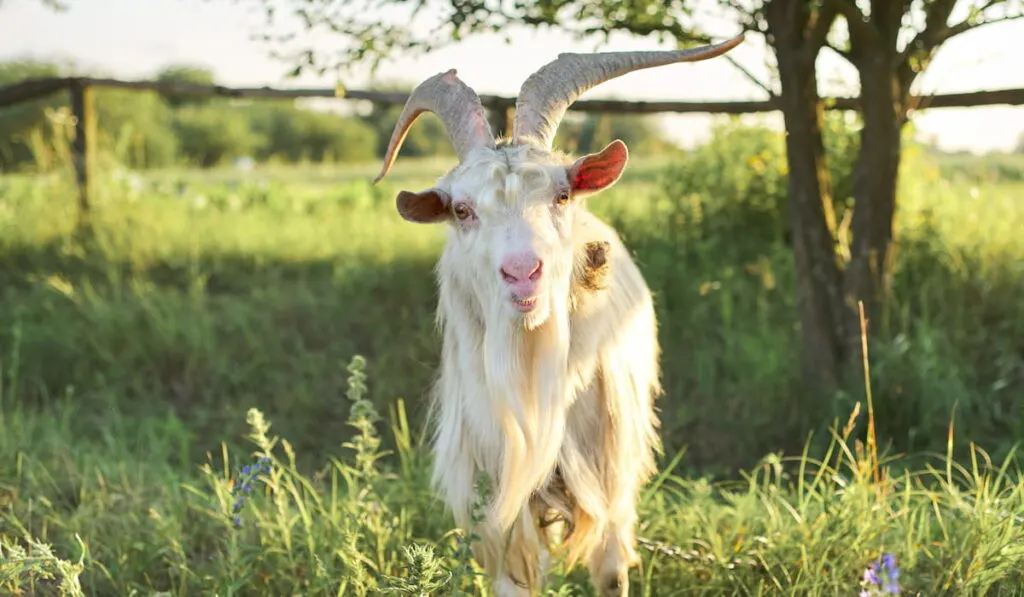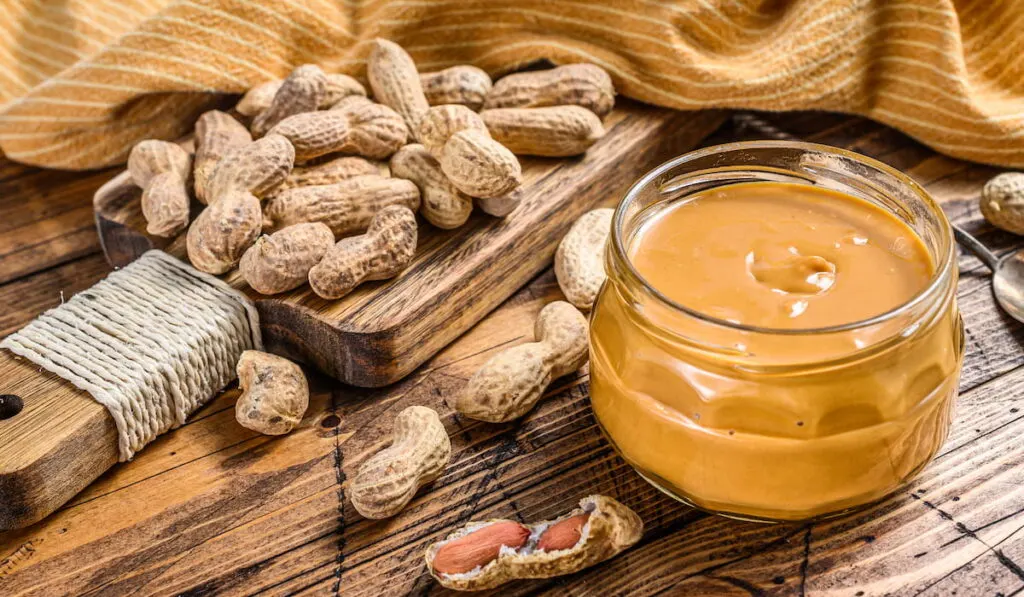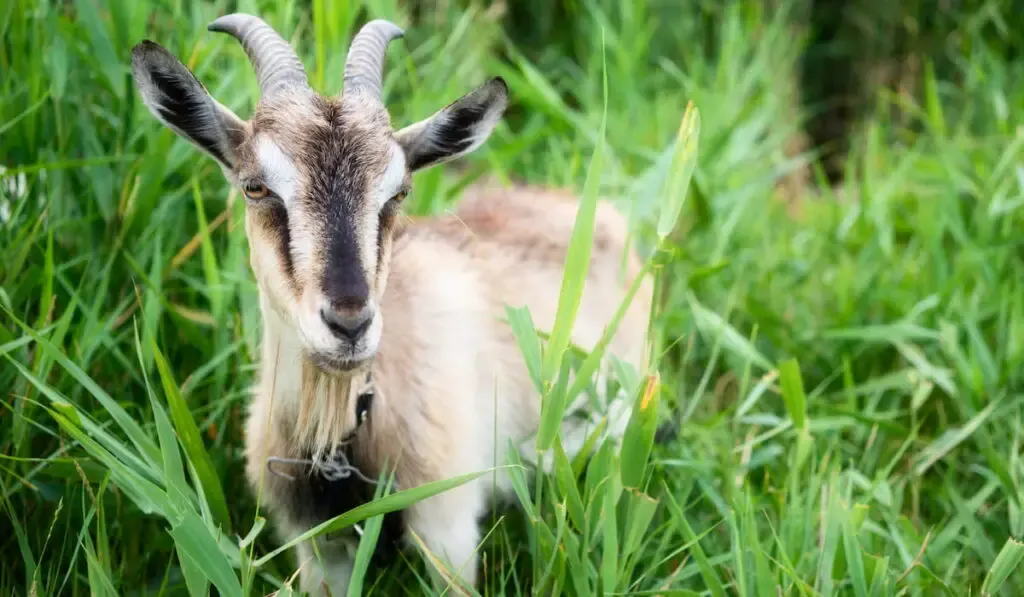Goats can and most likely will eat just about anything herbivores can eat.
For them, as long as it can fit in their mouth, they will probably eat it.
So, if you have, say, a jar of peanut butter lying around, your goats might go after it. But is it safe for them? Let’s find out.
Can goats eat peanut butter? Yes, goats can eat peanut butter and they seem to be very fond of it.
In many cases, the texture of the peanut butter does not matter to them. Whether crunchy or creamy, a goat will eat peanut butter whenever it’s available.
Yet, in all of this, moderation is key. Giving goats peanut butter in large amounts might cause gastrointestinal problems.

You probably want to know the benefits peanut butter offers your goats and much more. We’ll cover these points and more in the rest of this post.
Can Goats Eat Peanut Butter?
Goats can eat peanut butter. But it should be used as a treat for them, like peanuts, not as a meal replacement.
While peanut butter is safe, it does not meet all of a goat’s nutritional requirements. So, it is not fit to be the regular diet of goats.
Besides, if a goat consumes too much peanut butter, it might get sick.
In all of this, it is worth it to point out that goats love peanut butter.
To them, the texture is usually not an issue. Whether they are offered creamy peanut butter or crunchy, they will dig right in.
Before buying peanut butter for your goats or feeding it to them, check the ingredients.
While peanut butter itself is safe for goats, other ingredients may be harmful. For one, peanut butter may contain chocolate and goats should not eat chocolate.
Once you are sure there is no potentially harmful ingredient, you may let the goat consume it.
Is Peanut Butter Healthy For Goats?
Peanut butter is healthy for goats when certain conditions are met. Some of these conditions are as follows:
- It should be given in moderate amounts. When peanut butter is given moderately, there is little or no chance for the goat to experience gastrointestinal discomfort.
But if this condition is not met, the goat might have gut discomfort and get sick. - The peanut butter should be free of other ingredients that can be toxic to the goat. As we said before, peanut butter is safe for goats.
But the same cannot be said about the other ingredients that may be added to peanut butter products.
The onus is on you to confirm that all the ingredients are safe for goats. - The peanut butter should be fresh, and it should be stored properly. Peanuts and peanut butter are prone to infection with a mold called Aspergillus flavus.
This organism thrives in a humid and warm environment. It produces a toxin called aflatoxin. Aflatoxin is a carcinogen that affects the liver and many other parts of the body.
When peanut butter is free of toxic ingredients and is given moderately, it should remain healthy for goats.
Also, if it is properly stored, there should be no mold growth. Hence, no aflatoxin.

Peanut Butter Nutrition Facts and the Benefits to Goats
The following are some of the nutrients contained in peanut butter:
- Carbohydrate
- Protein
- Fat
- Sodium
- Potassium
- Magnesium
- Calcium
- Vitamin B6
- Iron
- Antioxidants
Carbohydrate
Peanut butter contains about 13 to 20% of carbohydrates by weight.
This carbohydrate content contributes just about 13% of the total calories offered in peanut butter.
Carbohydrate is helpful in energy generation in the body. However, too much of it can cause health issues in goats.
The relatively low amount of carbohydrates in peanut butter makes it a low-glycemic index food. So, there is less concern about having your goat eating excess amounts of sugar.
Also, if your goat is diabetic, then peanut butter might be a safe treat option.
Protein
Protein helps with the overall body growth and development of goats.
Protein promotes hair growth, horn growth, and tissue repair.
Peanut butter contains around 25% protein by weight. This protein content contributes to about 15% of the total calories in peanut butter.
So, protein also contributes to energy generation in goats.
In younger goats, protein deficiency is marked by stunted growth and low productivity. In older goats, a lack of protein leaves them susceptible to various diseases.
Fat
The fat contained in peanut butter is cholesterol-free. However, peanut butter contains unsaturated and saturated fats, with the former (the good one) present in a higher proportion.
Peanut butter contains around 50% fat by weight. This content contributes 72% of the total calories.
Fat provides calories to goats. When it is not used up, it is stored in fat reserves.
On cold days, these reserves can come in handy as the goats try to keep themselves warm.
Sodium
Sodium is essential for body-fluid balance in goats. It is the main mineral in the extra-cellular fluids of a goat’s body.
So, it is vital in the regulation of blood pH, heart rhythm, and muscle contraction. It also influences nerve transmission.
Potassium
Potassium is the main mineral inside body cells. It is involved in similar physiological functions as sodium.
In deficient states, the goat may lose vigor, have a poor appetite, experience body stiffness, or suffer urinary calculi.
Magnesium
Magnesium plays a role in enzyme function, metabolism, skeletal development, muscle function, and nerve function.
In deficient states, your goat may suffer grass tetany.
Calcium
Calcium is vital to the skeletal development of goats. It works alongside phosphorus and magnesium in bone formation.
Besides that, calcium is vital in the transmission of impulses in the nerves. Thus, low levels of calcium may affect nerve function in goats.
Calcium is also vital for the transmission of contraction impulses in the muscle of goats. It plays similar roles in the heart of a goat.
Sufficient levels of calcium must also be fed to goats to ensure they do not get milk fever.
All in all, calcium is pretty vital to the physiological functions of goats. It is recommended that goats get calcium in double the amount of phosphorus.
Iron
Iron makes up a part of hemoglobin; it is needed for the formation of hemoglobin. Hemoglobin is the protein in blood that carries oxygen. In deficient states, your goat will suffer anemia.
Antioxidants
Some of the antioxidants in peanut butter are resveratrol and p-coumaric acid.
These compounds help to fight oxidation stress in animals, and they may also lower the risk of various chronic diseases.

Dangers of Peanut Butter to Goats
The dangers of peanut butter come from excessive consumption. For one, peanut butter contains about 588 calories per 100 grams, which makes it very calorie dense.
If your goat consumes peanut butter in large amounts regularly, it will become obese.
Unfortunately, obesity leaves goats predisposed to various illnesses and can lead to death.
Excessive amounts of peanut butter may also affect the goats’ digestive system. In many cases, it may either cause diarrhea or constipation.
Final Thoughts
Goats can eat peanut butter but only as a treat.
In other words, peanut butter should only be given to goats in moderate amounts.
While peanut butter offers various nutrients, excess quantities can cause severe health issues in your goats.
Hence, it should not replace their regular diet.
Resources
- https://animalhype.com/pets/can-goats-eat-peanuts/
- https://morningchores.com/feeding-goats/
- https://www.drweil.com/diet-nutrition/food-safety/perplexed-about-peanuts/
- https://www.healthline.com/nutrition/is-peanut-butter-bad-for-you
- https://www.aces.edu/blog/topics/livestock/nutrient-requirements-of-sheep-and-goats/
- https://www.lincolnu.edu/c/document_library/
- https://goats.extension.org/goat-nutrition-sodium
- https://goats.extension.org/goat-nutrition-magnesium
- https://www.msdvetmanual.com/management-and-nutrition/nutrition-goats/nutritional-requirements-of-goats
- https://goats.extension.org/goat-nutrition-calcium/
- https://www.healthline.com/nutrition/is-peanut-butter-bad-for-you
